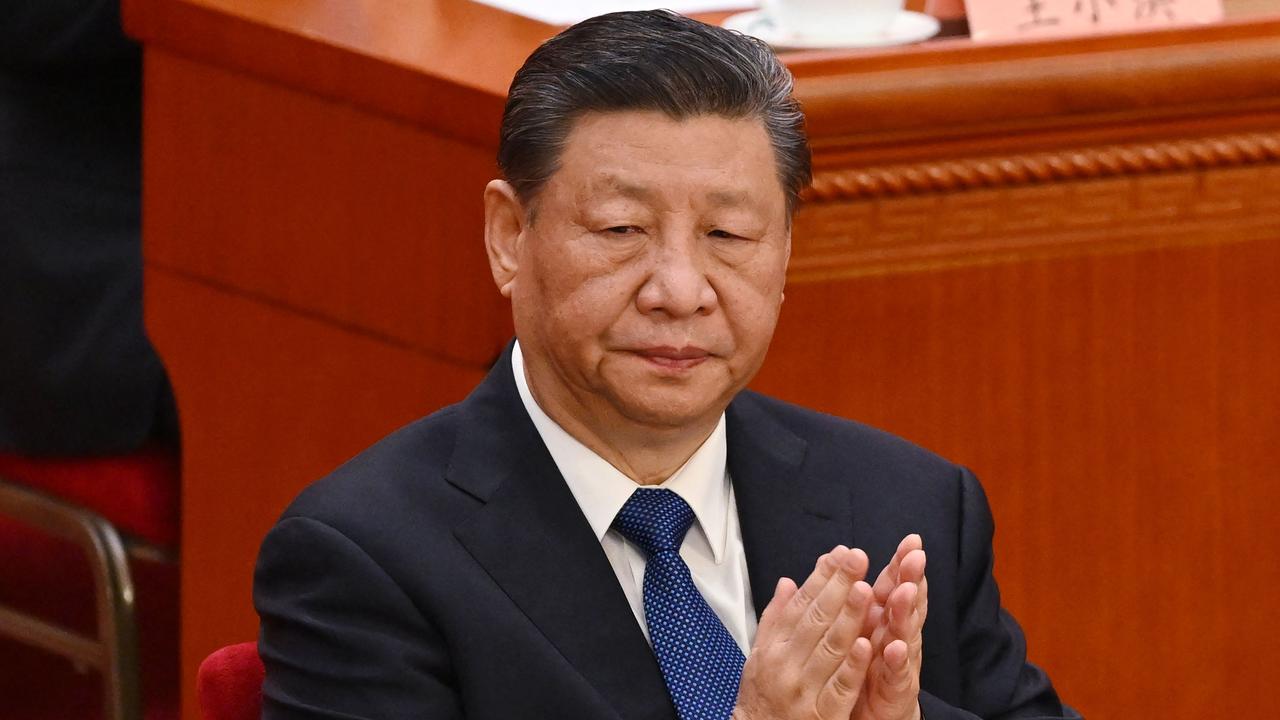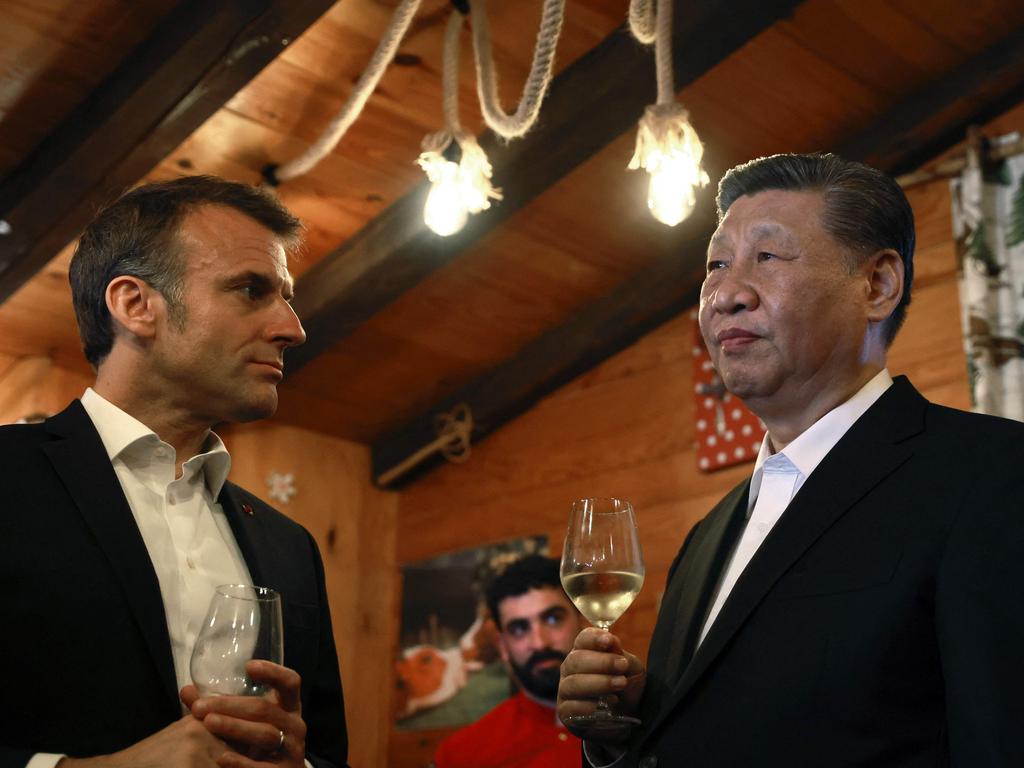Allegations of cyber espionage attacks across Europe cast shadow over Xi Jinping’s tour
While it was all smiles and champagne with Emmanuel Macron, damning allegations have clouded Chinese leader Xi Jinping’s whirlwind tour of Europe.

Allegations of concerted cyber espionage attacks across Europe have cast a shadow over Chairman Xi Jinping’s whirlwind tour of the continent.
The UK Defence Secretary Grant Shapps claimed a “malign actor” was behind a cyberattack on his military’s French-supplied payroll data system. Investigators “cannot rule out state involvement”, he added.
But UK Prime Minister Rishi Sunak obliquely blamed Beijing when referencing the attack, stating he would “set out a very robust policy towards China to protect ourselves against the risks that China, and other countries, pose to us”.
The accusation came as Chairman Xi met French President Emmanuel Macron and European Commission President Ursula von der Leyen in Paris on Tuesday Australian time for “friendly and very frank talks”.
Espionage was likely high among them.
And while traditional spying activities have been exposed, analysts say a recent spate of espionage across Europe also appears aimed at identifying those vulnerable to coercive pressures.
That’s a hallmark of China’s Ministry of State Security, says the Australian Strategic Policy Institute (ASPI). Its mission is to sow doubt among - and gain leverage over - its opponents.
“At least six Australian parliamentarians from both major parties have been targeted by Chinese state-sponsored hackers,” its executive director, Justin Bassi, writes.
“The people targeted are primarily critics of Beijing’s repression and international belligerence, sending the clear signal that those who speak out against malicious Chinese activity and support policies to counter it can expect a sustained campaign to silence, intimidate and discredit them.”
Cold war tactics
European intelligence agencies have exposed and arrested a slew of Chinese agents in recent weeks. Allegations range from spying and hacking to influence operations.
Among the arrests were three senior political aids.
A Chinese national assisting a German far-right politician has been arrested for supplying parliamentary material to Beijing and spying on Chinese dissidents living there.
Another parliamentary aide, this time in the UK, was also arrested last month. This came a few weeks after British authorities accused Chinese hackers of attempting to breach MP email accounts and the Electoral Commission.
And a member of Belgium’s far-right Vlaams Belang party was expelled after accusations of being recruited by Beijing as an intelligence asset.
Embassy Spokesperson on UK media hype-up of so-called “Chinese cyber attackâ€
— Chinese Embassy in UK (@ChineseEmbinUK) May 7, 2024
Full text: https://t.co/NX1hrWLYI7pic.twitter.com/yIyc4dBwqD
Several of China’s exposed espionage operations also had a military focus.
Three German nationals have been accused of supplying China with naval technology secrets. And earlier in April, the Dutch intelligence agency MIVD said Beijing’s operatives had targeted Dutch naval, aerospace and semiconductor industries - as well as hacking a military network.
The United States, however, is warning of more sinister intrusions.
FBI director Wray told an emerging threats conference early last month that a Chinese hacking campaign, dubbed Volt Typhoon, had penetrated US telecommunications, energy and water systems.
The goal, he said, was to give Beijing the “ability to physically wreak havoc on our critical infrastructure at a time of its choosing”.
Beijing denied the accusation, insisting the security breaches were instead by “a criminal ransomware group”. The Chinese Embassy in Washington DC blamed the United States: “Some in the US have been using origin-tracing of cyberattacks as a tool to hit and frame China, claiming the US to be the victim while it’s the other way round, and politicising cybersecurity issues.”


Of electric viruses and earworms
“China firmly opposes and fights all forms of cyberattacks. We also firmly reject using the cybersecurity issue politically to smear and vilify other countries,” China’s foreign ministry spokesperson Lin Jian told State-controlled media after the UK raised its allegations yesterday.
But the uproar surrounding Beijing’s global information manipulation and espionage campaigns continues to grow.
“Authoritarian regimes such as those in Beijing and Moscow are masters at identifying and exploiting national division,” ASPI’s Bassi says of their targeted social media troll campaigns.
“In our wonderfully messy democracies, differences are perennial, but they need to arise from robust debate over well-understood facts, not from strident ignorance supercharged by disinformation.”
Meeting with President @EmmanuelMacron & President @vonderleyen, President Xi Jinping stressed that #China-#EU relations enjoy strong endogenous driving force & bright prospects and doesn't target any third party nor should it be dependent or dictated by any third party. pic.twitter.com/YwQJxduU3t
— Yu Dunhai (@YDunhai) May 6, 2024
But he warns our own response to this unfolding information war is inadequate.
“At times, Australia and other democracies call out China’s most egregious behaviour—including its conduct in cyberspace, aggression in the South China Sea, human rights abuses and unfair trade practices,” he and former China policy advisor Andrew Forrest write. “But across the board, we’re hesitant, inconsistent and faltering.”
A University of Michigan report says the flood of deliberate and blatant disinformation is contributing to a growing sense of “news fatigue”, prompting many to avoid news altogether.
“The more confusing or difficult to navigate that you find the news environment, the more you actively avoid news,” says lead author Ariel Hasell.
“But it’s not just news. News avoidance also includes people avoiding discussing politics with others as well. So it’s not just not consuming news. You’re stepping out of the conversation completely.”






